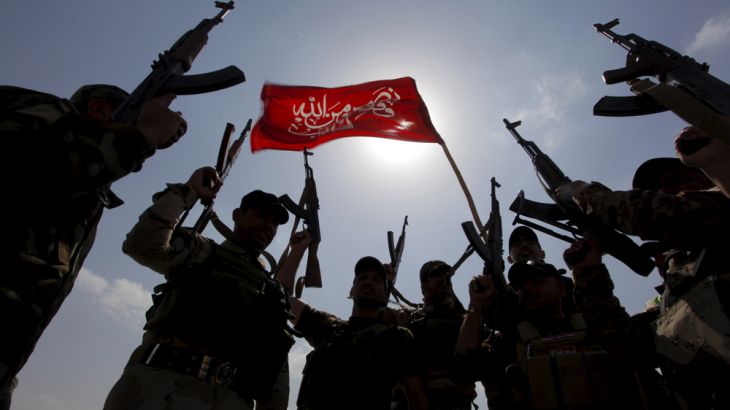Iraqi politician warns of sectarian violence in Mosul
Iraqi politician Khamis Khanjar says his Turkey-trained Nineveh Guards Force should spearhead Mosul attack on ISIL.

Iraq is at risk of partition and the worst sectarian bloodletting since the 2003 US-led invasion, if Shia paramilitary units get involved in the fight against ISIL for Mosul, a senior Iraqi politician warned.
Iran-backed Popular Mobilisation forces, or Hashid al-Shaabi in Arabic, are supported by the Shia-led Baghdad government and want to play a bigger role in the offensive to regain ISIL’s last major stronghold in Iraq.
Keep reading
list of 4 itemsThe Take: After Iran struck Israel, how did Jordan and Lebanon react?
The world cannot turn its back on Sudan and its neighbours any longer
Russia-Ukraine war: List of key events, day 784
But Khamis Khanjar, a Sunni politician and businessman who financed the 3,000 strong Turkish-trained force known as the Nineveh Guards Force, said it should lead the offensive, alongside the Iraqi army, and take control of the city after ISIL is driven out.
READ MORE: Iraqi militiamen sever ISIL’s key supply line to Syria
“Everyone is looking for salvation from Daesh [the Arabic acronym for ISIL] … but after Daesh is defeated a new dangerous phase will begin, if the United States and the government do not address Sunni grievances. This could threaten the future of the Iraqi state,” Khanjar said, in an interview with Reuters news agency in Amman, Jordan.
|
|
“The fear for the future of the country, the threat, is more than any other time.”
Mosul is already ringed to the north, south, and east by Iraqi government and Kurdish Peshmerga forces and Iraq’s US-trained Counter Terrorism Service breached ISIL’s defences in east Mosul at the end of October.
Khanjar, who has close ties with regional powers Turkey, the Gulf states and Jordan and aspirations to lead the Sunni community, said the consequences of Hashid al-Shaabi entering the city would be catastrophic.
International human rights groups and the UN Human Rights Commissioner have accused the Shia militia of abuses against Sunni civilians in towns and villages retaken from the Islamic State of Iraq and the Levant.
“The fear is the repeat of the same massacres and ugly violations committed by the Hashid al-Shaabi,” Khanjar said.
WATCH: Iraq’s parliament passes law legalising Shia militias
Hashid al-Shaabi leaders deny their groups mistreat civilians.
Khanjar said the Nineveh Guards Force, which is mainly drawn from the Mosul area, was ready to fight.
“They are present in the thousands,” said Khanjar, who met the forces and their commanders recently, adding their presence would assuage widespread fears of revenge attacks.
He said the failure of the Baghdad government to support the force, and lack of US support, was a mistake that fueled suspicions that Sunni concerns were not being addressed in the Mosul campaign.
Some of Iraq’s top Sunni leaders will meet in Amman this week to chart a political strategy to present to key Kurdish and Shia political parties, he said.
READ MORE: Turkey warns Shia militias fighting ISIL for Iraqi town
Sunni Muslims, who dominated Iraq under Saddam Hussein, accuse Shia leaders of marginalising them through sectarian policies, allegations Baghdad’s Shia-led government denies.
Khanjar said he supported a federation in which Sunni Muslims, Shia Muslims, and Kurds could all run their own parts of the country, without a formal break up.
“All the laws make the complexion of the state a religious Shia one, where Sunnis are more marginalised so we have no solution but to go to autonomous regions to protect us – or else partition,” Khanjar said.
|
|
| Battle for Mosul: Iraqi forces meet fierce ISIL resistance |